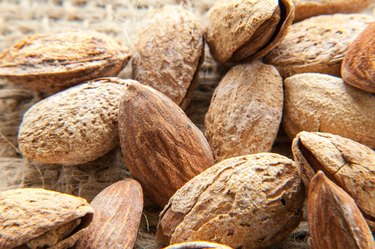
Lipids are a group of natural molecules that includes fats. While an excess of some lipids may contribute to an increased risk of certain health problems, lipids also carry vital nutrients and support the body's basic functions. Following a moderately low-fat diet may be appropriate for some, but cutting your fat intake too much can have serious health consequences.
Vitamin Deficiencies
Video of the Day
The vitamins A, D, E and K are fat soluble, meaning the body stores them in fatty tissue and the liver. The intestines need dietary fat to properly absorb these nutrients. These vitamins are necessary for the health of your skin, bones and cardiovascular system, among other organs and systems. Fat-soluble vitamins are present primarily in lipid-rich foods such as meat, butter and nuts. If you cut these fatty foods from your diet to reduce your lipid intake, you may not get enough fat-soluble vitamins. Vitamin K is found in many green leafy vegetables and you can get vitamin A through eating beta-carotene-rich fruits and vegetables such as sweet potatoes and melon. Vitamin E is found in nuts and oils and vitamin D is available from 15 minutes of sunshine or fortified low-fat dairy foods.
Video of the Day
Lack of Healthy Fats
Omega-3 and omega-6 fatty acids are considered essential fatty acids because although they're critical for health, your body can't produce them and must get them from food. Omega-6 fatty acids come from sources like oily seeds and nuts, while omega-3 fatty acids come primarily from oily fish like salmon and sardines. Without enough of these fats' sources in your diet, you may not get enough essential fatty acids, which could cause problems with your hair, skin, immune system and vision. Eating too little fat may also lower your blood levels of HDL, or "good" cholesterol, raising your risk of cardiovascular problems and stroke, warn experts from Boston College.
Effects on Energy
Although carbohydrates are your body's main source of energy, fat is also an important source. Without enough dietary fat, you may not easily meet your energy requirements. Your body will burn protein, rather than fat, impairing your ability to build muscle. Approximately 20 to 30 percent of your calories should come from fat. If you need 2,000 calories daily, around 600 calories should come from fat. Because lipids contain 9 calories per gram, you'd need 67 grams of fat daily to meet this requirement.
Other Body Functions
Lack of dietary lipids may cause problems with cell formation and function. The body uses certain parts of lipid molecules to build the membranes that enclose and protect your cells. Fatty acids, also contained in lipid molecules, regulate cell function by transmitting information between cells. Lipids are also important for hormone production. The body makes both testosterone and hydrocortisone from cholesterol, a type of lipid. Insufficient testosterone levels can cause low libido in both men and women, and low hydrocortisone levels may adversely affect your body's metabolism of carbohydrates, fats and proteins.
Choosing Dietary Fats
Your body doesn't need all lipids in equal amounts. Base your fat intake on polyunsaturated and monounsaturated fats, aiming for 17 to 27 percent of your calories from these fats per day. Get some omega-3 fats from sources like fish and nuts several times weekly. Limit saturated fats, which primarily come from animal products and tropical oils, to 7 percent of your total fat intake, suggest experts from the American Heart Association. Avoid trans fats, which are commonly found in commercially-packaged baked and fried foods. If you consume any trans fats you need to keep them to below 1 percent of your daily calorie intake.
- Richard Stockton College: Do Athletes Need Fat in Their Diets?
- Colorado State University: Fat-Soluble Vitamins
- Oregon State University: Essential Fatty Acids
- American Heart Association: Know Your Fats
- University of Cincinnati: Lipids: Fats, Oils, Waxes, etc.
- Boston College: Fat Chants: Making Sense of Dietary Fat Messages